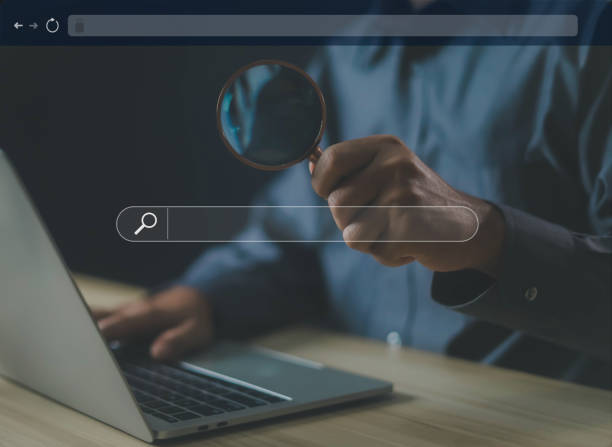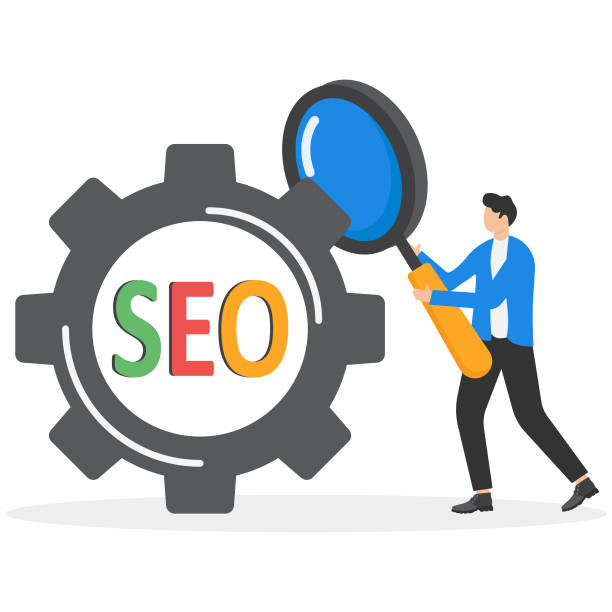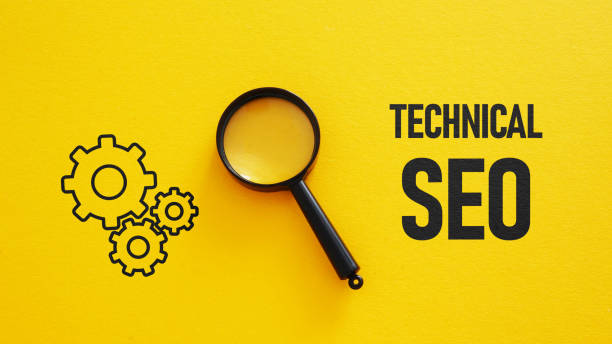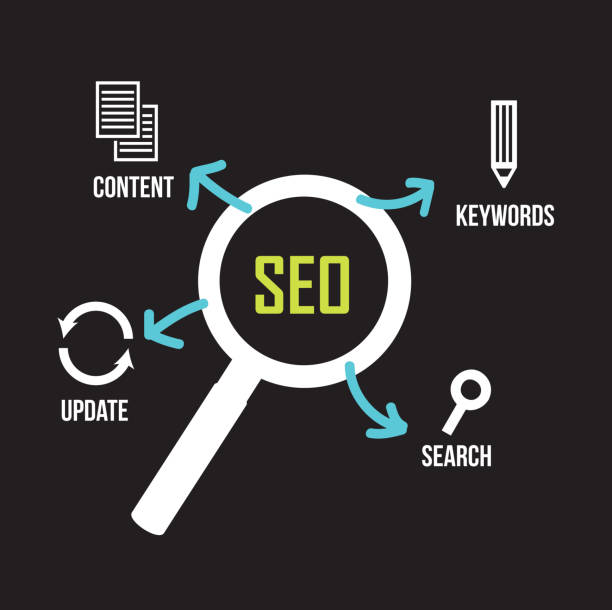What is SEO and why is it vital for your business?

SEO (Search Engine Optimization), or search engine optimization, is a process that helps your website achieve higher rankings in natural search engine results like Google.
This involves a set of techniques and strategies whose ultimate goal is to increase #visibility, attract #organic traffic, and ultimately improve your website’s #ranking.
The importance of SEO for any business in today’s digital world is undeniable; as the majority of internet users turn to search engines to find the products, services, or information they need.
A higher ranking in search results means greater visibility to target audiences and more opportunities for interaction with them.
In fact, SEO is considered a type of long-term investment that brings significant returns for businesses.
This process goes beyond merely placing a few keywords on a page and involves a deep understanding of how search engine algorithms work, user behavior, and market competition.
This section of the article takes an educational and explanatory approach to provide a basic and comprehensive understanding of what SEO is and its importance.
Without SEO, even the best websites and content may get lost among the vast amount of information available on the internet.
Disappointed with your e-commerce site’s low conversion rate? Rasaweb transforms your e-commerce site into a powerful tool for attracting and converting customers!
✅ Significant increase in visitor-to-buyer conversion rates
✅ Unrivaled user experience for enhanced customer satisfaction and loyalty⚡ Get a free consultation from Rasaweb!
Fundamentals of On-Page SEO

On-Page SEO refers to all the optimizations you can apply directly to your website to improve its ranking in search engines.
These elements include choosing appropriate keywords and strategically using them in page content, optimizing Title Tags, Meta Descriptions, and Heading Tags (H1-H6).
The title tag should be engaging and include the main keyword, while the meta description should provide an enticing summary of the page’s content that encourages users to click.
Additionally, content quality and relevance play a crucial role in on-page SEO.
Your content must be high-quality, unique, and relevant to target keywords, answering users’ questions.
Optimizing images with appropriate Alt tags, optimizing URL structure, and intelligently using internal links that connect relevant pages of your website to each other are other vital aspects of On-Page SEO.
These techniques not only help search engines better understand your content but also improve user experience.
This section serves as a comprehensive guide for optimizing your website’s internal elements to achieve the best SEO results.
Off-Page SEO Strategies and Their Importance

Unlike on-page SEO which focuses on internal website optimization, off-page SEO refers to all activities performed outside your website that help increase its credibility and authority.
The most important factor in off-page SEO is building high-quality backlinks.
Backlinks are essentially signals that tell search engines your website is credible and trustworthy.
The greater the number and quality of backlinks you receive from other websites, the more your Domain Authority will increase in the eyes of search engines.
In addition to backlinks, social media activity (Social Signals), brand mentions on other websites, and participation in relevant online forums also indirectly influence off-page SEO.
The main goal of Off-Page SEO is to strengthen your website’s online authority and reputation, which leads to better search rankings.
To better understand the differences between these two approaches, the table below provides a comparison of on-page and off-page SEO factors.
This section offers a specialized and analytical perspective on the importance of external factors in SEO campaigns.
| Factor | On-Page SEO | Off-Page SEO |
|---|---|---|
| Definition | Optimizing internal website elements | Optimizing outside the website to increase credibility |
| Examples | Title and meta tags, high-quality content, image optimization, internal links | Backlinks, social signals, brand mentions, influencer marketing |
| Control | Full control by the website owner | More limited control and dependent on other websites |
| Main Goal | Aligning website with keywords and improving user experience | Increasing website authority, trust, and reputation |
Technical SEO for Better Website Performance

Technical SEO refers to optimizations that directly impact how your website is crawled and indexed by search engines.
This aspect of SEO is highly specialized and requires precise technical knowledge.
Website loading speed is one of the most crucial technical SEO factors; slow websites can create a poor user experience, causing users to abandon the page, which negatively affects your ranking.
Optimizing images, compressing code, and using a CDN (Content Delivery Network) can help improve speed.
Mobile-Friendliness is also highly important, as a significant portion of searches today are performed via mobile devices.
A responsive design for your website is essential.
Issues related to Crawlability and Indexability using a correct robots.txt file and XML Sitemap are also critical.
Furthermore, implementing an SSL certificate for website security and using Structured Data (Schema Markup) to help search engines better understand your content are other key aspects of technical SEO.
This section provides a deeper explanatory view of the necessary infrastructure for successful SEO.
Are you falling behind in the competition with large online stores?
Rasaweb, with its professional e-commerce website design, brings your business online and increases your market share!
✅ Enhanced brand credibility and customer trust
✅ Easy shopping experience leading to more sales
⚡ Act now to get a free website design consultation!
Keyword Research, the Backbone of Every SEO Campaign

Keyword research is the process of finding and analyzing the phrases that users type into search engines to find your information, products, or services.
This step is the most fundamental in any SEO strategy; because without a proper understanding of the words your audience uses, you cannot create content that meets their needs and gets seen.
The goal of keyword research is not just to find high-volume keywords, but to understand the Search Intent behind each keyword.
Is the user looking for information (e.g., “What is SEO”)? Do they intend to buy (e.g., “buy cheap hosting”)? Or are they looking for a specific website (e.g., “Digikala website”)?
Various tools are available for keyword research that can help you find relevant keywords, their search volume, and competition levels.
Long-tail Keywords, which consist of three or more words, usually have higher conversion rates and less competition.
Additionally, analyzing competitor keywords can reveal new opportunities for you.
This process is educational and helps you build your content strategy based on real data and user needs, maximizing the effectiveness of your SEO campaigns.
Content is King: Content-Centric SEO

In the world of SEO, there’s a famous saying: “Content is King.”
This statement emphasizes the unparalleled importance of high-quality and valuable content in any search engine optimization strategy.
Your content should not only be optimized for search engines but, more importantly, also be engaging and useful for users.
Content that meets users’ needs, answers their questions, and provides comprehensive and accurate information has a greater chance of ranking high and attracting traffic.
There are various types of content you can produce: blog posts, videos, infographics, comprehensive guides, FAQs, and so on.
Focusing on producing thought-provoking content that encourages the audience to think and interact, or entertaining content that creates a positive user experience, can play a significant role in attracting visitors and reducing bounce rate.
Natural use of keywords in content, without unnatural stuffing, and ensuring its readability and proper structure (by using short paragraphs, subheadings, and lists) are important principles in creating SEO-driven content.
Search engines are increasingly focusing on the quality and relevance of content to the user’s search intent, so producing valuable content will remain the backbone of SEO success.
Measuring and Analyzing SEO Results

After implementing SEO strategies, it is crucial to continuously monitor and analyze your performance.
Measuring and analyzing results allows you to identify the strengths and weaknesses of your campaign and make data-driven decisions for continuous improvement.
Tools such as Google Analytics and Google Search Console are vital resources for this purpose.
Google Analytics helps you track organic traffic, conversion rates, user behavior on the website, and other important metrics.
Google Search Console provides valuable information about how your website appears in search results, the keywords through which you receive traffic, technical issues, and incoming and outgoing links.
Metrics such as keyword rankings, Bounce Rate, Dwell Time, and pages visited per session are all important indicators of your strategy’s success or failure.
Continuous analysis of this data is an analytical and informative approach that helps you constantly adjust your strategies.
The table below shows some of the key SEO metrics that should be monitored.
| SEO Metric | Description | Importance |
|---|---|---|
| Organic Traffic | Number of visitors from natural search results | Indicates website visibility in search results |
| Keyword Ranking | Website position for specific keywords in search results | Fundamental metric for measuring SEO success |
| Bounce Rate | Percentage of visitors who view only one page and then leave the site | Indicates content quality and user experience |
| Conversion Rate | Percentage of visitors who perform a desired action (e.g., purchase, registration) | Measures business success from SEO |
| Dwell Time | Amount of time a user stays on your website after clicking a search result | Indicates user satisfaction with content |
Local SEO for Physical Businesses

For businesses with a specific physical location serving customers in a particular geographic area, Local SEO is of paramount importance.
Local SEO helps you achieve high rankings in search results for location-specific queries (such as “restaurant near me” or “car repair shop in Tehran”).
This type of SEO differs from traditional SEO as its focus is on attracting local customers.
The core of local SEO is optimizing and managing your Google My Business (GMB) profile.
Ensuring the accuracy and completeness of information in GMB, including name, address, phone number, business hours, categories, and photos, is the first step.
Collecting and responding to customer reviews (online reviews) also plays a vital role in local SEO, as it signals trustworthiness to search engines and influences potential customers’ decisions.
Creating Local Citations in online directories and using local keywords in website content are other important local SEO strategies.
This section serves as a practical guide for businesses looking to strengthen their online presence in specific areas and gain a larger share of the local market.
Research shows that 80% of customers trust companies with a professional website more. Does your current site inspire this trust?
With Rasaweb’s corporate website design services, permanently solve the problem of customer distrust and a weak online image!
✅ Create a professional image and increase customer trust
✅ Attract more sales leads and grow your business
⚡ Get a free consultation
The Future of SEO: AI and Voice Search

The world of SEO is constantly evolving, experiencing significant changes with technological advancements.
Two main trends shaping the future of SEO are Artificial Intelligence (AI) and Voice Search.
Search engine algorithms such as Google’s BERT algorithm and RankBrain use AI to better understand user search intent and provide more relevant results.
This means that optimizing merely for keywords is no longer sufficient; creating content that answers more complex questions and demonstrates a deeper understanding of the topic has become more important.
Voice search is also growing significantly due to the popularity of voice assistants like Siri, Alexa, and Google Assistant.
Optimizing for voice search typically involves focusing on long-tail keywords and conversational content that resembles how people speak in real life.
Furthermore, concepts like E-A-T (Expertise, Authoritativeness, Trustworthiness) and User Experience (UX) have gained more importance as ranking factors.
This indicates that SEO is moving towards providing the best and most credible content and user experience possible.
This section provides an informative and analytical perspective on future trends in the SEO domain.
Practical Steps for Starting and Sustained Success in SEO

Starting the journey in SEO might seem complex at first, but by following practical steps and being persistent, you can achieve significant results.
The first step is to conduct comprehensive keyword research to identify the phrases your audience searches for.
Then, based on these keywords, produce high-quality and valuable content that addresses user needs and engages them.
Optimizing your website’s internal page elements (On-Page SEO), including title tags, meta descriptions, and URL structure, is the next step that should not be overlooked.
Concurrently, focus on improving your website’s technical SEO to ensure it is fast, mobile-friendly, and easily crawlable by search engines.
Next, build authority for your website through off-page SEO, particularly by building high-quality backlinks.
Finally, continuous monitoring and analysis of SEO performance using tools like Google Analytics and Google Search Console are crucial for optimizing and improving your strategies.
SEO is an ongoing process that requires patience and persistence.
This section serves as a practical guide and tutorial for starting and maintaining success in the competitive world of SEO.
Frequently Asked Questions
| Question | Answer |
|---|---|
| What is SEO? | SEO, or Search Engine Optimization, is the process of improving the quality and quantity of website traffic by enhancing the site’s ranking in natural (organic) search engine results like Google. |
| What are the main types of SEO? | SEO is divided into three main categories: On-Page SEO, Off-Page SEO, and Technical SEO. |
| What does On-Page SEO include? | On-Page SEO involves optimizing elements within the website, such as keywords, page title (Title Tag), meta description (Meta Description), content, URL structure, images, and internal links. |
| What is Off-Page SEO? | Off-Page SEO refers to activities outside the website that help improve its ranking, such as Backlink Building, social media marketing, and Brand Mentions. |
| What is Technical SEO? | Technical SEO deals with optimizing the technical aspects of a website to help it be better crawled and indexed by search engines. This includes site speed, mobile-friendliness, site structure, Sitemaps, and the Robots.txt file. |
| What role do Keywords play in SEO? | Keywords are phrases that users enter into search engines. Proper and targeted use of relevant keywords in content and site elements helps search engines understand your page’s topic and display it for relevant searches. |
| What is a Backlink and why is it important? | A backlink, or inbound link, is a link from one website to another. Backlinks act as a “vote of confidence” from other sites for search engines and play a significant role in a site’s credibility and ranking, especially if they come from authoritative sites. |
| How does quality content affect SEO? | High-quality, relevant, comprehensive, and unique content not only attracts and retains users but also shows search engines that your page is valuable. This helps improve rankings, reduce Bounce Rate, and increase user time on site. |
| Why is site loading speed important for SEO? | Site loading speed is an important ranking factor for Google. Faster sites provide a better user experience, have lower bounce rates, and are preferred by search engines. |
| Is SEO a one-time process? | No, SEO is an ongoing and long-term process. Search engine algorithms are constantly changing, competition is increasing, and site content also needs updating. Therefore, SEO requires continuous monitoring, analysis, and optimization. |
And other services of Rasa Web Advertising Agency in the field of advertising
Smart Link Building: A combination of creativity and technology for campaign management through precise audience targeting.
Smart Website Development: A blend of creativity and technology for user engagement through an SEO-driven content strategy.
Smart Sales Automation: A combination of creativity and technology to improve SEO ranking through an SEO-driven content strategy.
Smart Website Development: A fast and efficient solution to increase website traffic with a focus on intelligent data analysis.
Smart Marketing Automation: A fast and efficient solution to improve SEO ranking with a focus on marketing automation.
And over a hundred other services in the field of internet advertising, advertising consultation, and organizational solutions
Internet Advertising | Advertising Strategy | Advertorials
Resources
SEO Articles on Digiato
SEO Training on Mizbanfa
SEO Guide on Pishgaman
SEO Edu Blog
✅ Ready to take your business to the top in the digital world? Rasaweb Afarin Digital Marketing Agency, with its expert and creative team, is always by your side to pave your path to success with innovative strategies and comprehensive services. From SEO and optimization to professional e-commerce website design, we are here to turn your digital dreams into reality.
📍 Tehran, Mirdamad Street, next to Bank Markazi, Kazeroon Jonubi Alley, Ramin Alley, No. 6



